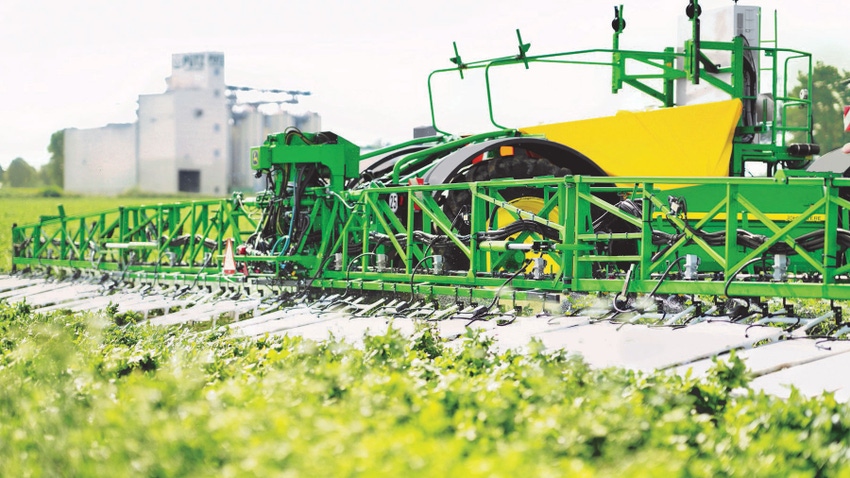November 17, 2023

In Europe, farmers want to control weeds without relying on chemicals. During Agritechnica 2023, Crop.zone shared its electricity-based weed control system, along with a new prototype the company developed in cooperation with John Deere.
The prototype earned the two companies a DLG Agrifuture Concept award during the farm show in Hannover, Germany, in mid-November.
“We were involved with the John Deere accelerator program,” says Dirk Vandenhirtz, CEO of Crop.zone. “That’s a one-year program, and we worked to co-develop a machine with a greater application width.”
The larger prototype is what earned the award, but Crop.zone has been an innovator in the weed control and crop desiccation space for several years. The challenge is that its 9- and 12-meter machines were best suited for Europe’s smaller farms. To expand in North America, the company needed to go bigger. The prototype comes in at 24 meters, or 76 feet. “But it’s still not big enough for North America,” Vandenhirtz admits.
The larger prototype, however, is a start down the road toward meeting the needs of larger farms.
How it works
The Crop.zone system is a two-part process, where in one pass, an electrolyte-surfactant mix is sprayed on the crop and an electric current is applied through a boom. Initial machines carry a front-mounted tank of the liquid electrolyte mix, while the shocking boom is mounted behind.
The larger prototype is based on the trailed version of a John Deere R900 Series sprayer (the European version) where the liquid tank and electric boom are in a single unit pulled behind the tractor. Called the Dual.Volt.24M, the project honored at Agritechnica was a concept study. A first prototype has been built and tested, and in 2024, Crop.zone will test the prototype in several applications with a wide range of farmers.
One benefit of this prototype being built on the sprayer platform is that the machine can still be a sprayer. This dual purpose adds value to the final design. Farmers can decide which way they want to kill weeds — with chemicals or by shocking. And they can also use chemical-free desiccation for crops such as oats, wheat and barley.
Cover crops, tough weeds
Using electricity on a plant breaks down its cells and destroys the chlorophyl, Vandenhirtz explains. “It has no effect on the seed, and it maintains soil quality,” he notes. “And beneficials are not harmed, including earthworms. And we have independent tests that verify those results, not just our own research.”
Darrell Bailey, who heads up the North America sales effort, says interest is growing over the use of electricity for crop desiccation. “Oat producers want to get away from using glyphosate on their crops,” he says. “It’s a big market opportunity for us.”
Crops including potatoes, barley, oats and wheat often turn to chemical desiccation to reduce biomass ahead of harvest. Turning on the juice and shocking those plants into harvest-ready status has value.
Cover crop termination is another opportunity. Many farmers are reluctant to deal with remains from cover crops ahead of planting. The Crop.zone system could solve that problem.
Finally, this system brings another tool for tackling herbicide-resistant weeds. However, more testing will be needed. If weed seeds are not killed by this system, application timing using the system needs further research. Some tougher-to-control weeds can produce seed early in their life cycle.
Crop.zone will be testing the machine on farms and with universities in 2024. Learn more about the system by visiting crop.zone online.
About the Author(s)
You May Also Like






